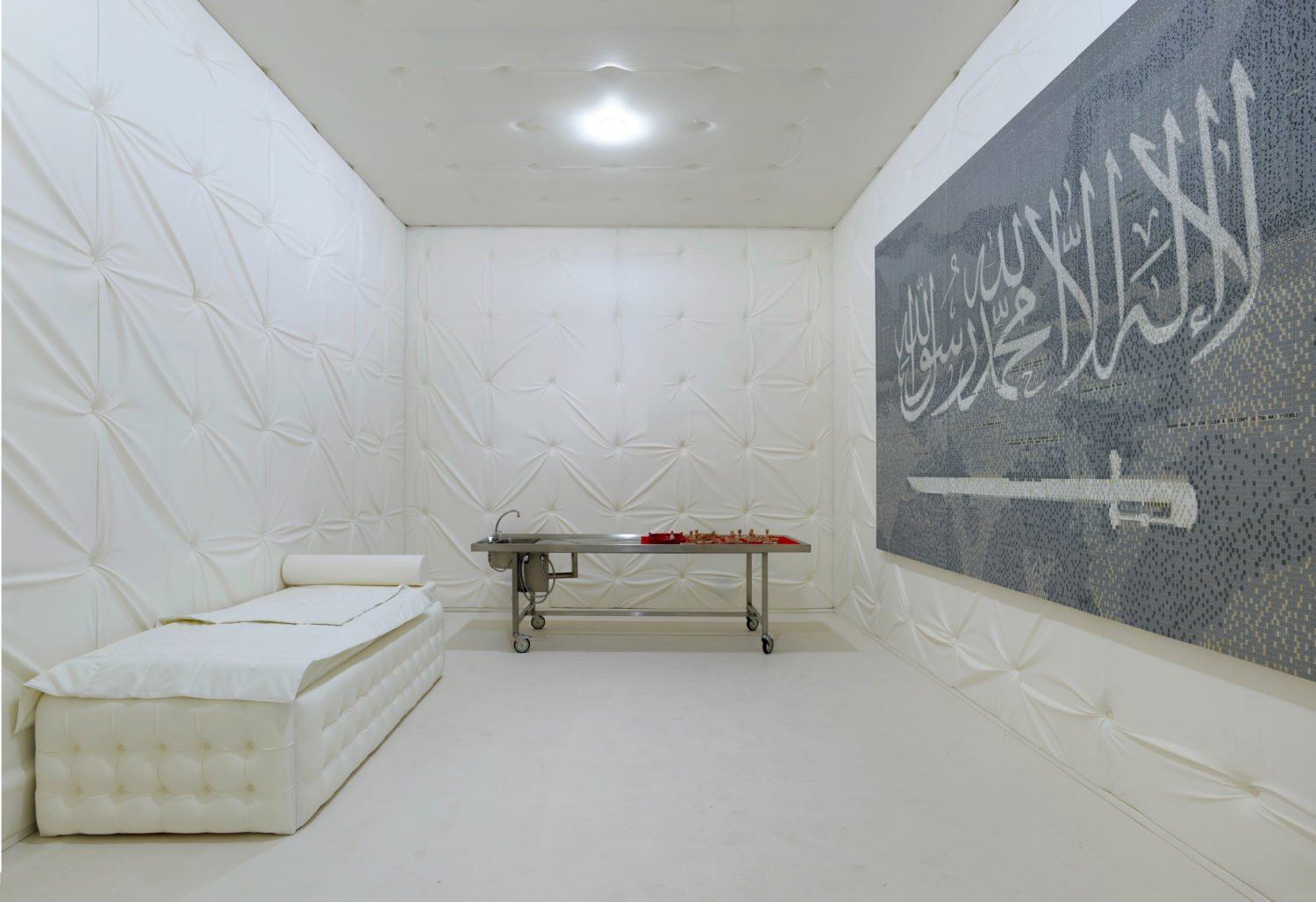
At Art Basel’s larger-than-life VIP opening, much of the work on view was entertaining, dazzling, or highly Instagram-ready. In contrast, Saudi Arabian artist Abdulnasser Gharem’s installation, a big white box with a door below a pale yellow awning, seemed rather unremarkable—until you stepped inside the sound-proof room after enduring the long line with other eager visitors.
The walls of the locked room (only one visitor is allowed in for a minute at a time) recall a padded prison cell or an insane asylum, and are covered in English and Arabic phrases stamped in red ink. Inside, about two dozen rubber stamps are set on a steel table, one of which reads, “the difference between the terrorist and the martyr is the media coverage” in both Arabic and English. The guard outside tells each person that they are allowed to stamp only the back wall—but, of course, the room is covered all over, because people don’t tend to listen, especially if they know they are not being watched.
The work is intended as a gentle allusion to the controversy surrounding the murder of journalist Jamal Khashoggi at the Saudi embassy in Turkey last year. By most Western accounts, the blame for the killing falls squarely on Saudi Arabia and its crown prince, Mohammad bin Salman, which makes the installation, called The Safe, a risky proposition by Gharem—especially considering he still lives in Riyadh, the Saudi capital.
Abdulnasser Gharem’s The Safe (2019) at Art Basel Unlimited 2019. Photo: Simon Vogel. Courtesy Galerie Nagel Draxler & Galerie Brigitte Schenk.
“The work does not make a clear reference or statement on [the death of Khashoggi], but it creates an atmosphere of insecurity and it’s a reminder that outside of this art fair, there is another reality,” says Saskia Draxler of Galerie Nagel & Draxler, which is representing the artist. “He is not pointing his finger or judging.”
But The Safe, which is priced at around $600,00 and is presented in collaboration with Galerie Brigitte Schenk, is nevertheless deeply provocative. The main table in the room is a dissecting table, which is a harrowing detail considering Khashoggi was dismembered in the Turkish consulate, according to a top Turkish prosecutor. A Saudi flag hangs above the table. Gharem has long made politically and socially engaged works that draw on his Muslim heritage, but The Safe speaks to broader issues such as citizen control, creative dissent, and imprisonment, and even murder.
Like its title, it seems inclined to incite conversations about important issues while still keeping the artist safe in his home country. In previous interviews, Gharem, a former lieutenant colonel in the Saudi Arabian army, has stressed that his work is not about taking sides.
Abdulnasser Gharem’s The Safe (2019) at Art Basel Unlimited 2019. Photo: Simon Vogel. Courtesy Galerie Nagel Draxler & Galerie Brigitte Schenk.
“He’s a master of communication, and he can open up conversations for people inside the country, but also on the outside,” Draxler says, noting that he learned how to work intelligently in the background and avoid direct confrontation from his time in the army. “He decided not to go into the diaspora and make clever comments from the outside. Rather, he copes the life [in Saudi Arabia] and works to elevate the art community there.”
Yet to expand Gharem’s reach, next year, Galerie Nagel & Draxler is planning to bring his work to Art Basel Hong Kong, in the hopes of creating further dialogue in a part of the world with a dubious record for protecting artists’ freedoms.
Prints at Nagel & Draxler’s booth are on sale for around $25,000. There are also two sculptures: one is an oversized stamp that says, “Have a bit of commitment,” and the other is a road block that is made from thousands of tiny rubber stamp with various political statements, such as “liberty cannot be fired like a bullet into the hard ground.” The sculptures are around $100,000.
In 2011, a piece by Gharem set an auction record for a work by an Arab artist when it sold for $890,621 at Christie’s.